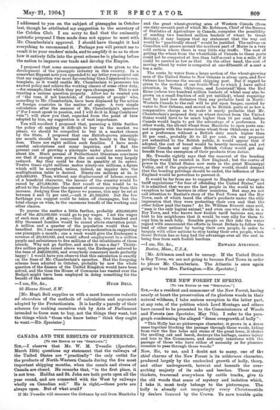LTO TEM EDITCOR OF TNT "SPECTATOR-1
observe that Mr. W. M. Tweedie (Spectator, March 12th) questions my statement that the railways of the United States are "practically" the only outlet for the products of North-Western Canada during the five most important shipping months, when the canals and rivers of Canada are closed. He remarks that, "in the first place, it is not true. Halifax and St. John are both ports open all the year round, and are connected with the West by railways wholly on Canadian soil." He is right,—those ports are always Open. But of what avail P If Mr. Tweedie will measure the distance by rail from Manitoba of Statistics of Agriculture in Canada, computes the possibility of sending two hundred million bushels of wheat to Great Britain), it may happen that my statement that the way out would be "practically closed" would be justified. The railway on Canadian soil passes around the northern part of Maine in a very cold section where there is very little way traffic. The cost of
getting the wheat from the wheatfields of Canada to these ports could not be computed at less than half-a-cent a ton a mile, if it could be carried as low as that. On the other hand, the cost of moving wheat by water is computed at one-fifteenth of scent a ton a mile.
The route by water from a large section of the wheat-growing area of the United States to New Orleans is alway open, and New Orleans has become the second shipping port. But if regard be
given to the section of our South-West to which I. have called attention, in Texas, Oklahoma, and Louisianon the Red
River (where two hundred million bushels of wheat may also be grown on a small fraction of soil yet =tilled), wheat requiring haul by land less distances than any probable haul in North- Western Canada to the rail will be put upon barges, carried by water to New Orleans, and moved on to British ports at so low a comparative charge as to make it surely probable that Mr. Chamberlain's proposed duty on wheat derived from the United States would have to be much higher than 10 per cent. before Canada would begin to get the advantage of a preference. In other words, the all-rail wheat from Manitoba to open ports can- not compete with the water-borne wheat from Oklahoma so as to get a preference without a British duty much higher than
10 per cent., probably 20 to 25 per cent. On any proposal yet submitted to the British public, it would appear that if adopted, the cost of bread would be heavily increased, and yet neither Canada nor any other British Colony would get any benefit from the exemption of their products from duties.
Mr. Tweedie rightly says that the removal of the bonding privilege would be resisted in New England ; but the centre of power in the United States now rests in the great Mississippi Valley, and if the grain-growers, as they would, should demand that the bonding privilege should be ended, the influence of New England would be powerless to prevent it.
It would be far from me to suggest to England any change in tariff regulations "for fear of offending the United States," and it is admitted that we are the last people in the world to take exception to tariff barriers in other countries. But may,we not call attention to Bastiat's story of the Fool Town and the Boy Town, each of which taxed the other's products under the silly impression that they were protecting their own and that the other fellow paid the taxes ? As Dr. William Everett once said, "man is the only logical animal," and even one who dwells in a Boy Town, and who knows how 'foolish tariff barriers are, may hint to his neighbours that it would be very silly for them to copy him in such folly. Sensible people on this side the water regard with amazement the efforts in Great Britain t9 follow the lead of other nations by taxing their own people, in order to bargain with other nations to stop taxing their own people, when Great Britain has so long had the advantage over all the rest in being free from such foolish burdens.
—I am, Sir, &c., EDWARD ATKINSON.
Boston, Mass., U.S.A.
[Mr. Atkinson need not be uneasy. If the United States is Boy Town, we are not going to become Fool Town in order to please Mr. Chamberlain. The Atlantic is once again going to beat Mrs. Partington.—En. Spectator.]


































 Previous page
Previous page